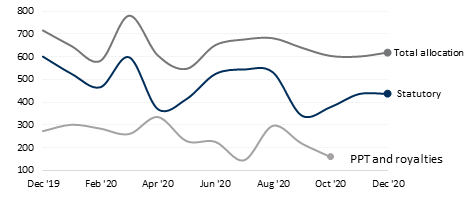FAAC Pays out NGN619bn In December 2020

The gross monthly distribution by the Federation Account Allocation Committee (FAAC) to the three government tiers and eligible agencies totalled NGN619bn (USD1.57bn) in January (from December revenue), This was NGN18bn above the previous month’s payout. From one brief account in the local media, we learnt that the take from companies’ income tax, and oil and gas royalties was substantially higher, that the distribution of VAT was higher and that the collection of petroleum profit tax (PPT) was much lower. State governments received a total of NGN210bn including 13% derivation for the few oil-producing states, the highest payout for three months (NGN222bn from September revenue).
The headline figure is made up of gross statutory distribution of NGN437bn, the VAT Pool of NGN171bn and fx adjustments totalling NGN11bn.
The trend in total distributions has been downward, from an average of NGN710bn in 2018 to NGN685bn in 2019 and NGN636bn last year. The crude oil price has started to pick up in the past three months but we need to remember that production has fallen sharply in line with (or towards) the OPEC quota (currently 1.52mbpd). We also need to remember that three months lapse between the initiation of a crude oil sale contract and the remittance of the sale proceeds to the federation account.

In contrast, we are encouraged by growing VAT collection when household spending has been squeezed. The hike in the standard rate in February from 5.0% to 7.5% is a factor, to which we add improved coverage. While the rise in mobile money and financial inclusion extends the tax net, VAT collection is highly concentrated. Data from the National Bureau of Statistics show that just four segments produced close to 60% of collection in 2019 (‘other’ manufacturing, professional services, commercial and trading operations., and state ministries and parastatals). The increase in collection amounted to 8.9% m/m and 90.0% y/y in December.
This latest payout to states falls far short of their spending, which averaged NGN351bn per month in 2018 and NGN396bn last year. It would not even have covered their salaries and pensions in aggregate.
A small number of states, led by Lagos, can meet all their obligations at these reduced levels of FAAC distribution because they collect substantial sums of internally generated revenue. Several are taking steps to create future revenue streams, an example being the allocation of land for the planting of oil palm (Edo State).




